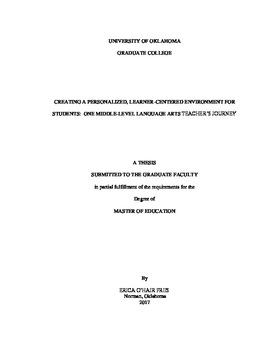| dc.description.abstract | Teachers create conditions within the classroom that strongly shape the nature of their students’ academic performance and future success. The purpose of this study was to describe and systematically analyze the changing beliefs, practices, and challenges of a middle level English language arts teacher’s journey from a traditional classroom environment, one that often lacks relevance to the real world and in which students sit passively for teacher-driven activities and curriculum, to a personalized, learner-centered environment rich with active engagement, student motivation, and relevance. Personalized, learner-centered classrooms have been tied to students developing skills that are associated with deeper learning such as improved collaboration and communication skills, academic engagement, self-regulation, and perseverance. These deeper learning skills are positively related to student attainment (National Research Council, 2012). While small pockets of innovative, learner-centered classrooms exist today, the vast majority of U.S. classrooms remain traditional.
The researcher collected autoethnographic data within a six-year timeframe using personal memory data, instructional unit plans, and fieldnotes. She examined her educational development including changing teaching beliefs, practices, and shifting classroom culture. Findings that have guided her changing beliefs and practices included: the curriculum being natural rather than forced; the need for student-driven process and assessment; and the acceleration of student-centered teaching through authentic collaborations. These findings and related epiphanies were examined through the lens of the Jobs for the Future and the Council of Chief State School Officers’ Educator Competencies for Personalized, Learner-Centered Teaching (Wolfe & Poon, 2015). The researcher described each competency that she made progress on and how shifts in her beliefs and practices could stimulate additional thought and future examinations of competencies by others interested in developing personalized, learner-centered environments. | en_US |
